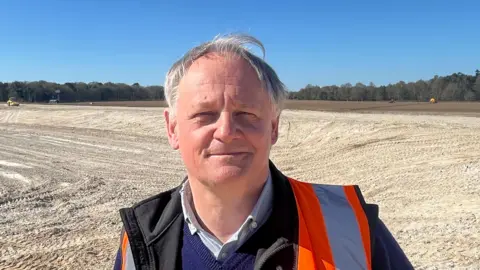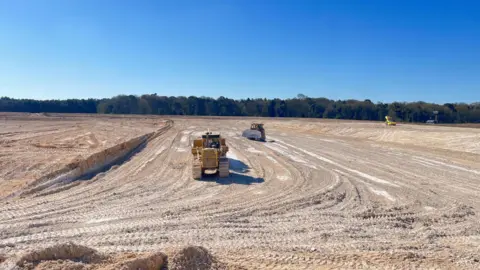Dry March weather sees farmers planning for future
 Richard Daniel/BBC
Richard Daniel/BBCWith this March having been the driest for 60 years, some farmers are taking measures to protect themselves in the future.
Elveden Farms, close to the border between Suffolk and Norfolk, is building its third water reservoir, costing about £3m.
Andrew Blenkiron, managing director, said: "It is a significant investment but we see it as one of the only ways that we're going to guarantee our supply of water throughout the season."
Mr Blenkiron said they grew crops that required significant amounts of water, such as potatoes, onions and carrots.
He said their reliance on ground water was potentially under threat, with licences for boreholes being reviewed.
Mr Blenkiron said new reservoirs were needed across the country, particularly in East Anglia, to capture water in winter so it could be used in drier months.
 Richard Daniel/BBC
Richard Daniel/BBCMr Blenkiron said only 5mm (0.2in) of rain fell at the farm in March, compared to an average of 55mm (2.17in).
He said they currently had capacity to irrigate the crops that were already in the ground, but rain would "reduce the cost significantly".
 Ben Parker/BBC
Ben Parker/BBCEd Youngman farms at Red House Farm, Charsfield, Suffolk, which grows blackcurrants and other crops.
He said they had not started irrigating yet but would this week "which is around the usual time".
Mr Youngman said: "It's really dry in the wheat and barley; they're not showing signs of stress yet, but it won't be long."
However, the dry weather had its advantages, Mr Youngman said - it had meant their work had not been disrupted by rain over the last few months, "but it could have an impact on future yields".
Follow Suffolk news on BBC Sounds, Facebook, Instagram and X.
